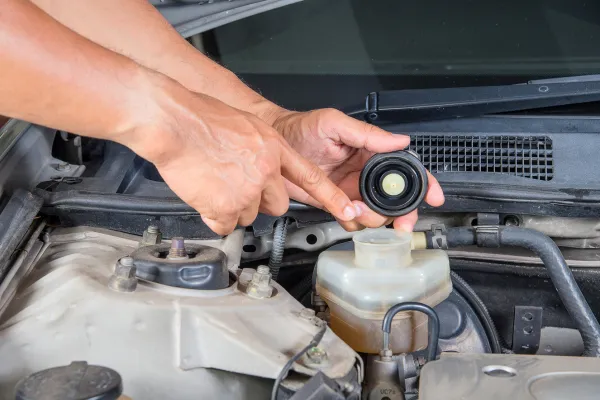
Why Fluid Checks Matter More Than You Think
Fluids are your car’s lifeblood — but most drivers only think about oil. Ignoring the rest can quietly damage your engine, brakes, or transmission long before warning lights come on.
Here’s what every Albuquerque driver should know about fluid checks.

The 5 Essential Fluids You Should Be Checking
Whether you're driving a Toyota sedan or a BMW SUV, these are the critical fluids that need regular inspection:
Motor Oil: Lubricates and cools engine parts. Dirty or low oil = fast engine wear.
Coolant/Antifreeze: Keeps your engine from overheating. Old or low coolant can cause major damage.
Brake Fluid: Transfers force to your brakes. Contaminated fluid can cause soft pedals or poor stopping.
Transmission Fluid: Ensures smooth shifting. Low or dirty fluid can lead to costly repairs.
Power Steering Fluid: Helps you steer easily. When it’s low, steering feels heavy or jerky.
These fluids degrade with time and use — not just mileage — especially in the New Mexico heat.
Why Routine Fluid Checks Save You Money
When fluids get dirty, contaminated, or low, the systems they protect start to fail silently.
Here’s what unchecked fluids can lead to:
Overheating engines
Grinding brakes
Hard or slipping gear shifts
Damaged steering components
Costly repair bills
A quick fluid check can prevent hundreds — or even thousands — in repairs. At Independent Vehicle Service, we check fluid condition and levels, so you're never caught off guard.

What We Check (and How Often)
At Independent Vehicle Service, we recommend a full fluid inspection with every oil change — or at least every 3,000–5,000 miles.
What we do differently:
Visual inspection for clarity, color, and contamination
Check for leaks or signs of early failure
Honest advice: “top off,” “flush soon,” or “replace now” — no pressure
We service all makes, but specialize in Volvo, Toyota, VW, BMW, and Lexus — and know what fluids fail most often in each.
FAQ: Fluid Checks and Maintenance
Q: Which fluids are most important to inspect?
A: Oil, coolant, and brake fluid are the most critical — but all five core fluids (including transmission and power steering) impact your car’s performance and longevity.
Keep Your Car Healthy, Inside and Out
If you can’t remember the last time your fluids were checked, it’s probably time. Call Independent Vehicle Service at 505-247-9771 to book a quick inspection today.
Because what you can’t see under the hood can still cost you.
